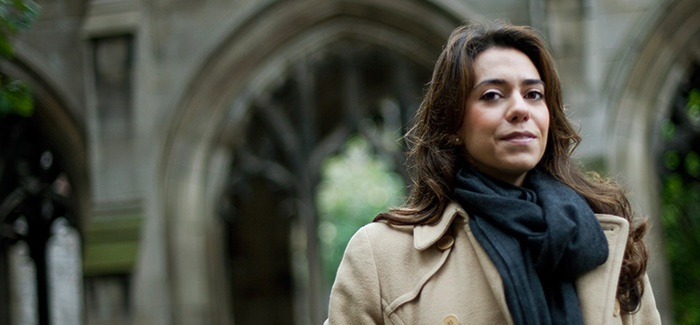
Telling Oscar Grant III’s story was “a sacred thing,” Spyropoulos says. (Photography by Drew Reynolds)
The critical success of the drama Fruitvale Station gives an aspiring producer’s career a boost.
A year ago, the gritty indie film Fruitvale Station won drama awards from the Sundance Film Festival’s jury and audience—only the fourth film in 29 years to pick up both. In May it received a standing ovation at Cannes on its way to receiving an award at that festival.
Fruitvale Station tells the true story of how Oscar Grant III spent New Year’s Eve 2008, an otherwise normal day except that it ended with a bullet in his back. Unarmed, he was shot and killed by a police officer in the eponymous Oakland, California, train station in the early morning of January 1, 2009, in what was later ruled involuntary manslaughter—the officer claimed he meant to use his Taser on Grant.
Haroula Rose Spyropoulos, AB’02, MAT’02, was one of two associate producers on the project. Reviews noted the movie’s strong performances and deft handling of the incident’s racial dynamics. But the soulful English major is quick to point out that the cast and crew didn’t think about accolades during the shoot; they were losing sleep over dramatizing a conflict that went deeper than showing good guys and bad. “The thing that carried everyone through,” Spyropoulos says, “because you don’t have a ton of resources, you’re not spoiled, it’s not a big-budget Hollywood movie, was that you always knew you were doing something important and that mattered, and I swear to God that was such a light inside of everyone. It was like a sacred thing.”
Spyropoulos’s work on the movie included helping director Ryan Coogler and the production team in casting, securing financing, scouting locations, and giving feedback on the script and editing. She assisted in communicating with Grant’s friends and family, for instance securing releases, and pieced together the film’s soundtrack with recommendations from Coogler.
There’s still a bullet hole in the platform at Fruitvale Station, she says. Before the camera rolled on the climactic gunshot scene, Coogler had Michael B. Jordan, the actor who played Grant, lie on top of it to bring real-life emotion to the scene. “Those were nights where beforehand we would all get into a circle and hold hands and basically say a prayer,” Spyropoulos says. “It was pretty scary on some level to reenact something that has happened so recently.”
Spyropoulos says that Coogler and producers Forest Whitaker and Nina Yang Bongiovi didn’t want to give Grant’s story the ripped-from-the-headlines treatment that plays on stereotypes and sensationalism. “It was a nice opportunity to give someone’s life a kind of honor that was taken away,” she says. She thinks that Fruitvale’s intimacy is what made it connect with so many people: “The more personal and specific you get, the more universal you become.” The cast and crew were hopeful that Oscar nominations, announced in mid- January, would recognize the film, though Spyropoulos says she likely wouldn’t get a seat at the award show.
Spyropoulos is also a singer-songwriter, and shooting Fruitvale meant a long break from recording and performing. Now the Chicago native, who gives off a gypsy–June Carter vibe, is readying a new album. Her lonesome, jangly songs have aired on TV shows including How I Met Your Mother and American Horror Story.
Spyropoulos may never get back to another long tour, though. Fruitvale’s success is opening doors for her in the movie business. She’s again working with Coogler, her former film school classmate at the University of Southern California, this time as a cowriter and coproducer on an HBO pilot that will also draw from real Oakland lives. She can’t say much more about it, but she can talk about optioning a book by another artistic alumna, Bonnie Jo Campbell, AB’84.
Campbell, who loved Fruitvale Station, says the movie’s success convinced her agent that they should sign a deal with Spyropoulos, who came calling in January 2012 to inquire about an adaptation of Campbell’s novel Once Upon a River (W. W. Norton, 2012). “We just thought, let’s just wait a while and make sure,” Campbell says. “It was nothing against Haroula, she always seemed like the real deal. It’s such a big chance to work with somebody brand-new who doesn’t have experience. And then she was getting experience in the meanwhile, so it was perfect.” They signed the deal in October 2013, giving Spyropoulos first dibs on the rights to the novel and Campbell her first book option.
“A year goes by and everything’s changed because nobody knew this movie was going to be such a success,” Spyropoulos says of Fruitvale. It’s left her with lots of irons in the fire. “I don’t know what’s going to happen,” she says. ”You’ve just got to keep doing your thing and doing the stuff that you resonate with and that feels authentic.”
